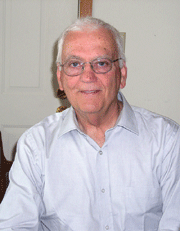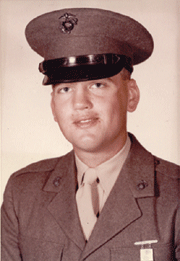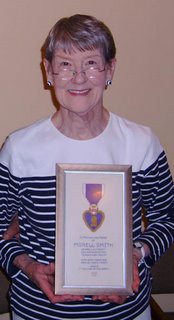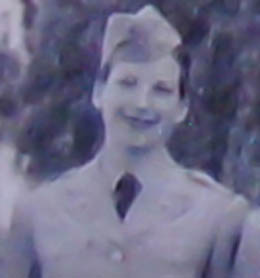
 New Hope’s Joe Doherty (left) is now an author of two books and a borough parking meter officer. He was in active service with the Marines (right) from 1961 to 1966.The Marines taught this Bucks resident lessons for life.By Daniel Brooks
New Hope’s Joe Doherty (left) is now an author of two books and a borough parking meter officer. He was in active service with the Marines (right) from 1961 to 1966.The Marines taught this Bucks resident lessons for life.By Daniel Brooks
BucksLocalNews.com EditorLike most U.S. Marines, Joe Doherty believes life is a mission and he is lucky to be serving in it. While his time in active service was from 1961-66, his commitment to the values he learned as a Marine has been life long.
Now 67 years old and a resident of New Hope, Dougherty grew up one of three boys in the Bronx, son of Irish and German working class parents. In the 1950s — his high school days — life in the Bronx was changing. A New York borough built largely on immigrant family life and religious morality; the kids of the Bronx in those days were learning to be rough, tough and rowdy. Doherty refers to the era as “Rock Around the Clock” years. He saw himself swaying in an aimless direction upon graduation from high school with no particular goals or direction, a good time guy looking for the next party. It was an era of confusion: one side trying to hold down the post-World War II ethics of family and country above all, the other — the” beat generation” — looking to change what appeared to them as a vanilla “sugar-coated” world.
It was a tumultuous time and Doherty was caught squarely in the middle.
“It could have gone in any direction for me. I was a two-bit punk from the Bronx,” says Doherty. “But I found myself at a recruiting office one day and it changed me. The Marine Corps saved my life.”
Now the sole survivor of that family, except for his 90-year-old mother, he is thankful for the opportunity to live every day to its fullest.
Despite his many attempts to get shipped overseas, Joe Doherty did not see combat action in the service. The Marines found his abilities to be most valuable to them on the home front.
After boot camp on Parris Island, S.C., and a short stint in Infantry Training at Camp Geiger, N.C., his innate talent as a mechanically minded individual scored him high on his Military Occupational Specialty test and that meant permanent assignment to the Marine’s base at Beaufort, S.C., as a radio mechanic. At first it made him miserable, seeing his friends readied and shipped out to a conflict in Santo Domingo or, eventually, to what was to become a hot bed of strife in Vietnam.
Doherty tried hard to get himself reassigned to active duty. He attempted to “request mast” — a formalized Marine procedure that enabled him an opportunity to state his case for active duty to various officials in the chain of command, asking repeatedly for a “Duty Station Change.” However, the most he was able to change was his assignment from a mechanic working in a civilian environment to one surrounded by fellow Marines in a Marine Corps warehouse. But Marines learn, above all, that when there is an assigned task — no matter what the task — the job is not to whine, but simply to get the job done. So, Doherty settled in to becoming the best mechanic that he could be and eventually earned the rank of non-commissioned corporal.
His stint as a formal Marine officer lasted for four years and, after being arbitrarily reassigned in stop-loss fashion because the country was at war in “the Nixon years,” Dougherty left the Marines and went back to the Bronx where he briefly found outlet for his youthful abilities and desire for action in the New York City Police Department as a rookie cop. He found his first wife — a marriage that lasted 35 years — and began having children.
“The pay for a cop in those days — $6,000 a year — wasn’t really making it for a guy with a growing family,” Doherty says, and he joined a construction company where he remained employed for most of his career. As a member of the International Union of Operating Engineers, Doherty led a disciplined family life raising four children until a divorce sent him on an uncharted journey.
The divorce was a trying time but Doherty considers it a turning point of his life and he is very emotional about it even today.
“To a Marine who is taught to succeed at all costs, divorce represents complete failure,” he says. “That is a terrible state to be in and I was torn up, completely down on myself. I could have ‘crawled into a bottle’ and shut myself off.”
But as fate had it, an uncle died and left property to Doherty and a cousin — two uninhabitable cabins in Monroe County, N.Y. — and Doherty found a refuge.
“The cabins were a mess, with no running water or heat. I set out on a mission to make them livable,” he says. “They were barren and had not been habited since my grandmother. One day I was working in the cabin and, out of no where, an old photo fell from a rafter. It was me as a child. How or why it got there I don’t know. There was no reason for it to be there.”
But the mysterious occurrence gave Doherty a new confidence.
“It was an epiphany for me, one of those moments in life. I didn’t think much about God in those days, but I saw it as a sign that he was thinking about me,” he says.
From that moment, Doherty became refocused in life and put much effort into learning scripture and reading the Bible. From that period, his first self-published book, “In His Hand,” was born.
“It is stern scripture but told in a humorous way, relating to funny things in my life,” he says. Asked about the book’s premise, Doherty explains that “it is about evangelisms and testimony but, most of all, it is about rising above the ‘poor me’ thing.”
Five years ago, through an Internet site, Doherty became acquainted with Kathryn Kelly from Alexandria, Va., and the two met shortly thereafter on a date. Kelly, formerly from Philadelphia, had a country home in New Hope, the two eventually married and Doherty moved to New Hope, where he authored his second book, “Grandly Told Tales and the Donahue’s of Solebury.” It debuted five months ago in a book signing at the legendary John and Peter’s bar and restaurant. It is a fiction book, set locally, “loosely based on my life, touching social issues, alcoholism, life and death, death in the streets.”
Like many Marines, Doherty has “heroes” and his hero here is his real life friend, John Donahue, who he had looked up to as the consummate “stand up guy.”
Doherty continues to relay his life experience through prose and literature and now works on a series of short stories. His books are available locally at Post Mortem Gallery, 12 Mechanic St., in New Hope.
Though no longer working full time, he is far from retired and is employed part-time by New Hope Borough as a meter officer. His military background and ethics are employed, he says, when giving out parking tickets. While he states that he will often give people the benefit of the doubt and he carries quarters in his pocket to feed meters where he thinks the car owner is just late, when he sees that a violation has clearly occurred, he spares no one, irregardless of their status in the community.
“If I see a wrong and I can fix it, I am there,” he stated. “I am known as ‘the hammer’ because while I don’t have a quota per se, I do my job.”
He continues to maintain his ties to the military and the Marines as an active member of the Marine Corps League at their branch in Doylestown and also belongs to the New Hope post of the American Legion. In the former, which meets monthly, Marine Corps life is constantly talked about and reinforced. They are, Doherty describes, “the crème de la crème’ of former Marines. They have structure and ribbons, metals and rank. They mentor young people and operate the ‘Young Marines’ group that you see frequently raising money.” He serves the group as “Web sergeant”—the man responsible for maintaining their online presence.
Clearly, for all that it has been to and for him, Doherty is proud to have served the U.S. Marine Corps.
“In my life I have worn suits worth hundreds of dollars and, on the lapel, have a Marine Corps pin that probably cost a dime,” he says. “But the pin to me is worth many times more than the suit.”
He regards the Corps as having taught him “self-respect, self-reliance, respect for country, motherhood and a ‘can do’ attitude about everything. What is it that they say? Marines analyze, improvise, adapt and overcome. Wherever I go, and I see a Marine, there is an instant bond. Marine’s are brothers for life.
Labels: Marines, New Hope

 After Texas, Weston was sent to Munich, Germany to aid in US hospitals operating during the reconstruction of a war-torn German landscape.
After Texas, Weston was sent to Munich, Germany to aid in US hospitals operating during the reconstruction of a war-torn German landscape. RSS Feeds
RSS Feeds





